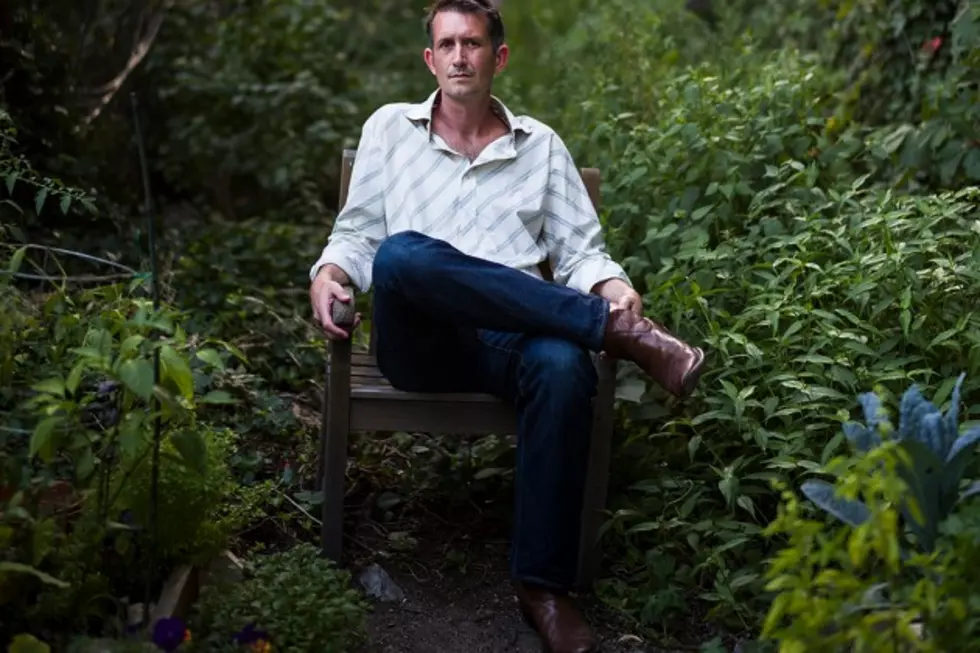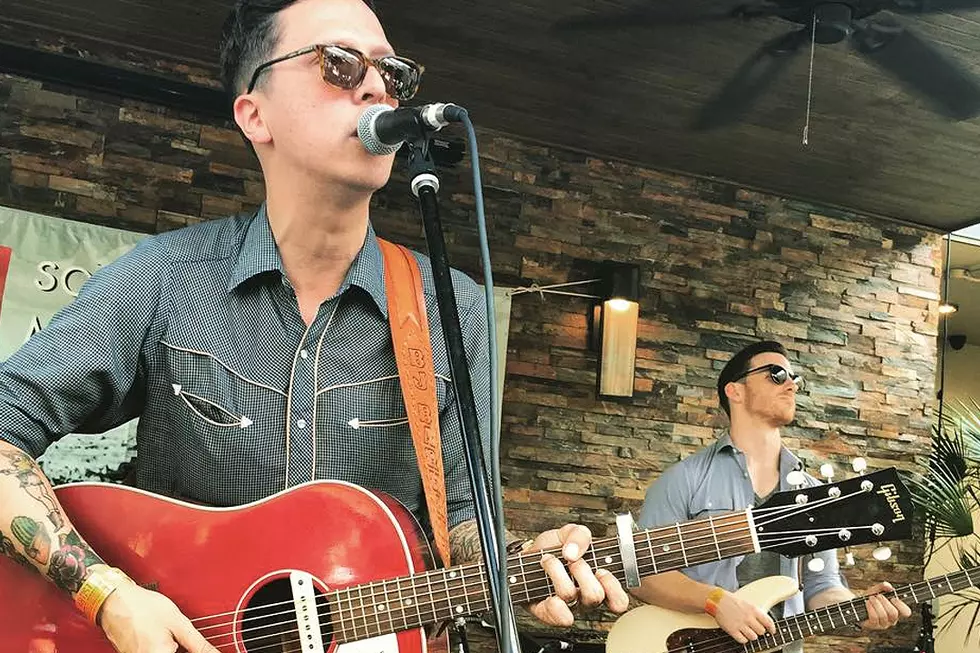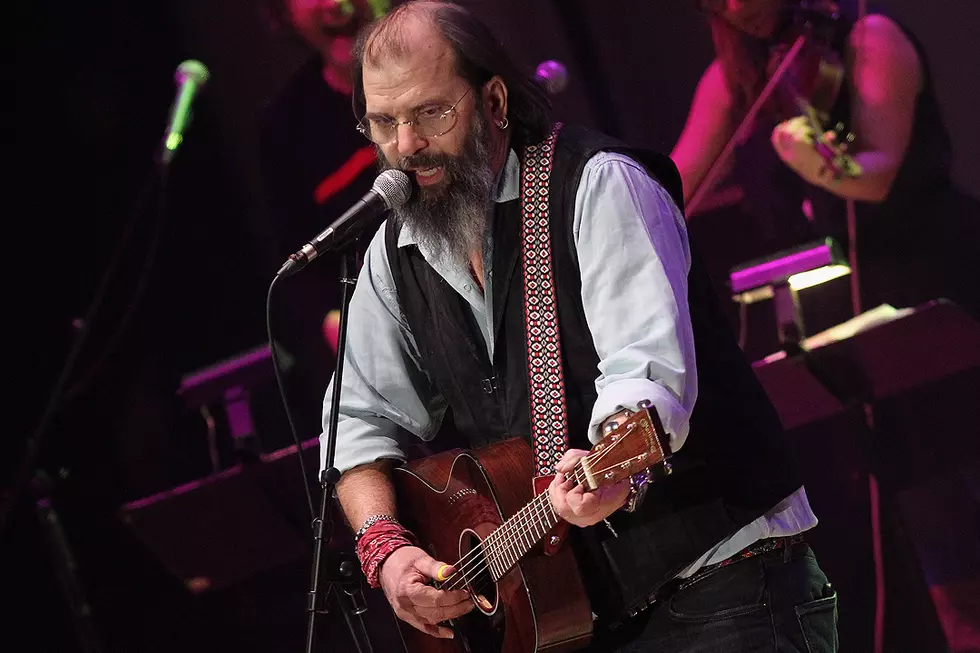
In Conversation With Ronnie Fauss
On Nov. 4, 2014, Ronnie Fauss celebrated the release of his sophomore full-length effort, Built to Break, via Normaltown Records. Packed with all the grit and raw alt-country rock fans have come to expect from his short but constantly growing career, Built to Break is a perfect representation of Fauss’ Texas-fueled authenticity.
Ahead of a recent solo acoustic gig at Midtown Live in New York City, Fauss spared a few minutes to sit down with us and chat about the new album, how he got started in music and what it was like collaborating with Rhett Miller of the Old 97’s. Check out our exclusive conversation below:
Word on the street is you started in music at a really young age.
Yeah, that's right.
How early?
In elementary school, I started taking piano lessons. The deal with me was that I would instrument hop. I’d get two months into a particular instrument and then I’d quit and go on to something else. I never really got good at anything, that’s the result of that. I just developed this ability to be mediocre at a bunch of things. [Laughs]
Were your parents and siblings musical?
My mom was a big piano player and my sister was big in the choir and all that. It was a big deal. I was even writing a lot of songs in elementary school. A ton. I’d demo them out with my Casio keyboard, the whole thing.
Do you have any of those lyrics still?
I don’t. I have some from high school, but none of the really old stuff.
You grew up in Oklahoma, right?
I was born there but I grew up in Texas.
I grew up in Kansas, so I still consider Texas as part of the Midwest. Do you think growing up in that area affected you, on the way that you wrote and learned to play the guitar?
Definitely. I think you can kind of tell a uniqueness from a lot of bands and artists that come out of Texas, no matter what their genre is. I think there’s a distinct ethos down there. It’s a little bit hard to put your finger on, but I do think it exists. When I was young, probably without me really knowing it, being in Texas ... it was obvious that there is this great lineage of country-folk singer-songwriters. The names are common: Townes Van Zandt, Guy Clark, Steve Earle, Lyle Lovett, Rodney Crowell, it just keeps getting passed from generation to generation.
You mention those artists, but you also seem to be influenced by bands like Uncle Tupelo and Son Volt.
Oh yeah, if I had to pick the two strains of influence one would be what I just mentioned, how to write a song from that old Texas tradition, but sonically, definitely the ‘90s when that whole thing was happening. That’s what got me interested in writing and recording my own music. There was a band called Slobberbone from back then who would tour around with a lot of those guys, Whiskeytown and Drive-by Truckers, and they’re from Dallas. I’d go see them all the time and they actually helped me make my very first EP about five years ago. That was the scene out of which I was writing and recording. I love that stuff. It gets a bad rap, but it’s great stuff. Those albums that came out of the ‘90s, they were incredible.
I couldn’t agree more. Son Volt’s Trace is one of my favorite albums of all time.
Trace is unbelievable. For me, all three of those Whiskeytown albums are just perfect, too. That is one of the very few bands, if not the only band, that I’ll just hit shuffle and I know it will be consistent.
I’ve just been getting into the Silos, about three decades too late. Cuba from 1987 is definitely defining for the genre.
Oh man, I gotta write that down. It’s funny you bring it up because about a week ago I decided to make a Spotify playlist of alternative country, but only from the ‘80s. So, I listen to it almost as much as a cultural experiment as I do for enjoyment. Some of the production is so god awful.
Who do you have on it?
The only band out of the scene we were talking about back then was the Jayhawks. They’re the only ones who have releases from the ‘80s. Other than them, it’s a lot of the people who are still active today, so I’m just going back to what they did back then. Steve Earle, John Hiatt, Lyle Lovett, Rodney Crowell. The thing that I noticed, though, is that a lot of those guys took the ‘80s off! Guy Clark, he had like one album in that decade. But, I think Lyle Lovett’s early stuff is so great and Steve Earle’s first two records might be my favorite.
Not to jump too far ahead, but you’re currently with Normaltown Records, which is part of New West Records, whose roster boasts Steve Earle. What does that mean to you?
Well, it means a ton. [Laughs] It’s something I never dreamed would happen. It’s just great. They are one of the premiere, if not the premiere Americana label with Steve Earle and John Hiatt and others. It’s a huge honor to have the same people who work on their stuff work on my stuff. I never expected it. John Hiatt, I discovered him ... you know, I didn’t really listen to grunge at the time -- when Nirvana was actually happening, I was out buying John Hiatt albums. He had a bunch in the early ’90s that were really great. It’s pretty surreal to be with this label, just because of those two guys alone. They informed so much of what I was doing early on.
I’d never want to speak for Hiatt or Earle, but I’m sure they enjoy seeing that the genre is in good hands with guys like you.
Yeah, well, hopefully. Robert Ellis is doing the same thing. I hope they feel that way!
So you put out your EP five years ago and then your full-length a little bit later.
Yeah, though there’s a little bit of a back story to that. In '09, '10 and '11, I put out four different EPs just on my own. That’s the point that I met the New West folks and then I started making plans for a full-length. I got rid of the four EPs and handpicked 11 songs out of there and that’s what is on that full-length.
From my perspective, it seems like you had a lot of time in your life before you started releasing music. 2009 isn’t that long ago, especially considering how early you started in music. Why is that?
I think there are two answers to that. One is that it was always just a side hobby for me, always. When I was growing up, going to school, getting married -- I never took music seriously until six years ago. Now, if you’re asking why I never took it seriously, I don’t even know if I have a good answer. It just wasn’t my thing. When I was 21 years old, I didn’t want to just jump into it. I was at school, I was looking for a job, I was getting married, I just wasn’t doing it.
But, when I look at back at it, it would be possible to look at it with a little bit of regret -- but I don’t. You know why? Nothing that has happened in the last five or six years could have happened back then. I had to live the life of doing other things. There were so many different experiences that I had at the time before I was making music that are what I write about. The way I think about it is if I had put out my first album when I was 21 years old, it would have been awful. I mean, it would have been just wretched. I’m glad I took my time.
As you released some music and then signed with Normaltown, did being affiliated with an actual record label affect your creativity at all?
I think there were times when I tried to let it affect it, but it just never took. [Laughs] What are you supposed to do now with a label? You’re supposed to have a co-writing session, you’re supposed to approach the whole thing a certain way. But none of those things bore much fruit. The way I write songs now is the same way I wrote songs five years ago. They happen organically when I’m trying to not make them happen. I can sit down and try to force a song for five days in a row and I’ll get nothing. The next day I’ll be mowing the lawn and it will hit me and that’s the song that I have. The good songs don’t happen until I’m not trying to write them.
I think your music is really honest, so that makes sense that these songs aren’t born out of any forced situations. They seem to be created authentically.
What you just said is my number one goal, it really is. If people don’t like it, that’s fine. That’s one thing.
But nobody could say that you’re not genuine.
Right, or that I’m not true to the sound that I hear and that I communicate what I want to communicate. To me, that’s the thing.
When I listened to Built to Break the first time, "The Big Catch" hit me. It took my breath away.
Good! Good! That is the goal with the song.
I pulled my wife to the side and said, “You have to listen to this. You have to hear it.” The lyrics, the music. What’s really interesting is that it didn’t hit me because I can relate to it. Fortunately I grew up in a healthy house with a great family, but this song just knocked me back. When you write something like that or when you perform it live, what’s that like? Is it emotionally taxing on you? That’s a very emotional song.
It’s personal, but it’s not autobiographical, so for that reason, it’s really not too taxing. Sometimes it is if I let my brain go there, it definitely can be. But most of the time it’s not. The deal on that song is that it is ... okay, I’m a father and I have young kids. I’m hyperaware of what’s happening in their lives today and what I’m doing today, and what will reverberate for them 30 years from now. That’s just where my head is at. So when I wrote that song, I was just pulling from a bunch of different stories from a few different people who are all at different points in their lives. I took all those emotions and everything I’ve seen and wrote that song as a composite of a lot of different things I’ve seen.
It’s such a good song.
I’m glad you like it. You know what I was listening to when I wrote that song? Southeastern by Jason Isbell. He’s got a few songs on that album that are similar thematically, or at least in their heaviness. I’m glad you pulled that song out because to me, it’s the most important song on the album. I’m so proud of the content of it. Yeah, I like how it sounds, but I just love the bones of the song. Ballads have a tendency of getting lost, you know? The most-played songs on Spotify are usually the fast songs on the album, people just gravitate to those. This song, though, is so important to me, I really felt like it should be the anchor of the album, so I put it toward the top of the tracklist. No matter what, I was going to make sure people would hear this song!
I think one of the greatest parts of alternative country is the storytelling that is found in songs. You literally tell stories through your music.
Of all the people we’ve talked about, my number one songwriting influence is John Prine. That’s the guy that I model it all after in terms of how I want to write a song. He might be the best at that, you know?
Yeah, that makes perfect sense. Another great songwriter and performer is Rhett Miller, and he’s featured on Built to Break. How’d you get hooked up with him?
I’ve just known him from being in Dallas. That’s where he grew up and that’s where I’ve lived for a long time. I’m good friends with his brother, too, so I’ve just known the family for a long time. When I was starting out, he was always supportive and would give me feedback and whatever I needed. He’s just a cool guy, he’s really open and affable and generous. He’s a really nice guy. Because of that, when we had that song tracked, we started having the conversation of getting someone in the studio.
First off, it was just to mix it up sonically, but second of all, we wanted someone who could add a little weight to the whole thing, you know? He was a natural fit. The song is very Old 97’s-ish in terms of style. We went to him and it was really easy. He listened to it and he liked it and he said yes. We booked a studio and did it. That was a really cool moment, it was surreal. After so many years, before I would even write a song, I’d listen to the Old 97’s and see them in concert and then start writing. So, to hear him sing one of my songs ... it is surreal.
You’ve mentioned Spotify a couple of times. YouTube, iTunes, do things like that influence you artistically?
No. They really don’t. I’m aware of them when it comes to our business decisions, but no, when I sit down to write a song or put something together for a performance, those things don’t affect me at all.
As a burgeoning artist, what’s your view of the music industry?
It’s just the Wild Wild West right now. Everything is shifting and people are trying to figure out how it’s going to look and how you can sustain your business. Labels have to figure out how to sustain themselves, and I don’t think anyone knows for sure. I know they’re trying, and I think New West is on top of everything, but it’s tough. You know, after watching the whole Napster thing roll out in 2000, the companies and artists who see where it’s going and embrace it, and make it work for them, I think that’s the right approach. I think it depends on who you are. We have to figure out a way to adapt. But who knows what that looks like?
A year from now things could look completely different.
The one thing I’ve thought about a lot is with all this digital stuff, there are lots of people who say they think the album is going to go away and music will just be released as singles. That’s the one thing I don’t see happening. The people making the decisions are artists and people who work for labels. By definition, those groups love music and the tradition of music. I think the album format really means something to people. It might not mean something to the general public, but I think it means something to the people making the music.
Let’s say CDs disappear and everything goes digital -- I still think we’ll have albums. You say it’s important to you, it’s important to me. When I put my 11 songs together, the flow from beginning to end is very important. I thought about every single track and why it was there. For instance, track 10 is “Old Life,” it’s a fast country rocker. Track 11 is kind of the benediction of the album, an acoustic ballad. It was very important to me to have an upbeat track as the second-to-last song on the album. I did the same thing on the last album. I want you to have to pay attention to every song on the album, I think that makes a statement. This is a document with a beginning and an end.
Do you have plans for Built to Break's follow-up?
I’m starting to think about it and I’m starting to get excited about it. You know, if I’m back in the studio in a year, that’d be great. It’s exciting. No plans yet, but I’m always thinking about it.
You can pick up Ronnie Fauss' latest LP, Built to Break, on CD, digital and vinyl formats at this location -- and make sure to check out Fauss' official website for his complete tour itinerary.
More From Diffuser.fm









